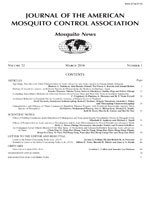Essential oils extracted from 4 different plant species—citronella (Cymbopogon nardus), hairy basil (Ocimum americanum), sweet basil (Ocimum basilicum), and vetiver (Vetiveria zizanioides)—were investigated for their irritant and repellent activities against Anopheles minimus, using an excito-repellency test system. Pure essential oils were used in absolute ethanol at the concentrations of 0.5%, 1%, 2.5%, and 5% (v/v) compared with deet. At the lowest concentration of 0.5%, hairy basil displayed the best irritant and repellent effects against An. minimus. Citronella and vetiver at 1–5% showed strong irritant effects with>80% escape, while repellent effects of both oils were observed at 1% and 2.5% citronella (73–89% escape) and at 5% vetiver (83.9% escape). Sweet basil had only moderate irritant action at 5% concentration (69.6% escape) and slightly repellent on test mosquitoes (<50% escape). The results found that hairy basil, citronella, and vetiver are promising potential mosquito repellent products for protection against An. minimus.
How to translate text using browser tools
1 March 2016
Avoidance Behavior to Essential Oils by Anopheles minimus, a Malaria Vector in Thailand
Jirod Nararak,
Sunaiyana Sathantriphop,
Kamal Chauhan,
Siripun Tantakom,
Amanda L. Eiden,
Theeraphap Chareonviriyaphap
ACCESS THE FULL ARTICLE
It is not available for individual sale.
This article is only available to subscribers.
It is not available for individual sale.
It is not available for individual sale.
Anopheles minimus
DEET
essential oils
excito-repellency





